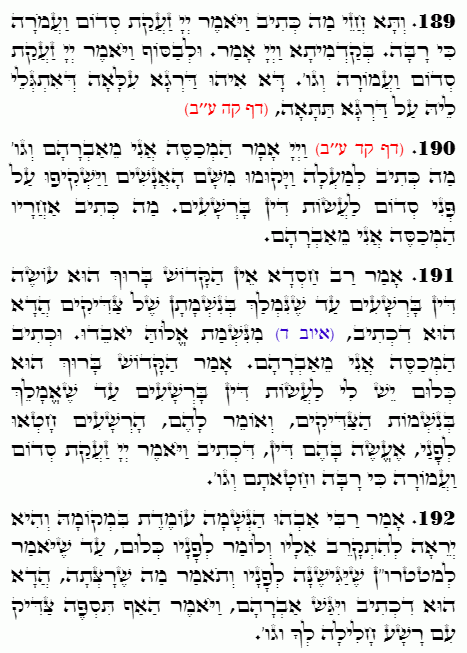Daily Zohar # 4704 – Vayera – He consults with the souls of the Tzadikim
Daily Zohar 4704

Hebrew translation:
190. וַה’ אָמָר הַמֲכַסֶּה אֲנִי מֵאַבְרָהָם וגו’. מַה כָּתוּב לְמַעְלָה? וַיָּקֻמוּ מִשָּׁם הָאֲנָשִׁים וַיַּשְׁקִפוּ עַל פְּנֵי סְדֹם, לַעֲשׂוֹת דִּין בָּרְשָׁעִים. מַה כָּתוּב אַחֲרָיו? הַמֲכַסֶּה אֲנִי מֵאַבְרָהָם.
191. אָמַר רַב חַסְדָּא, אֵין הַקָּדוֹשׁ בָּרוּךְ הוּא עוֹשֶׂה דִין בָּרְשָׁעִים עַד שֶׁנִּמְלָךְ בְּנִשְׁמָתָם שֶׁל צַדִּיקִים. זֶהוּ שֶׁכָּתוּב (איוב ד) מִנִּשְׁמַת אֱלוֹהַּ יֹאבֵדוּ. וְכָתוּב הַמֲכַסֶּה אֲנִי מֵאַבְרָהָם. אָמַר הַקָּדוֹשׁ בָּרוּךְ הוּא: כְּלוּם יֵשׁ לִי לַעֲשׂוֹת דִּין בָּרְשָׁעִים עַד שֶׁאֶמָּלֵךְ בְּנִשְׁמוֹת הַצַּדִּיקִים. וְאוֹמֵר לָהֶם: הָרְשָׁעִים חָטְאוּ לְפָנַי, אֶעֱשֶׂה בָהֶם דִּין, שֶׁכָּתוּב וַיֹּאמֶר ה’ זַעֲקַת סְדֹם וַעֲמֹרָה כִּי רָבָּה וְחַטָּאתָם וגו’.
192. אָמַר רַבִּי אַבָּהוּ, הַנְּשָׁמָה עוֹמֶדֶת בִּמְקוֹמָהּ, וְהִיא יְרֵאָה לְהִתְקָרֵב אֵלָיו וְלוֹמַר לְפָנָיו כְּלוּם, עַד שֶׁיֹּאמַר לְמטטרו”ן שֶׁיַּגִּישֶׁנָּה לְפָניו וְתֹאמַר מַה שֶּׁרָצְתָה. זֶהוּ שֶׁכָּתוּב וַיִּגַּשׁ אַבְרָהָם וַיֹּאמַר הַאַף תִּסְפֶּה צַדִּיק עִם רָשָׁע וְגוֹ’, חָלִילָה לְּךָ וגו’.
.
Zohar Vayera
Continued from previous DZ
#189
Come and see what is written: “וַיֹּאמֶר ה’ זַעֲקַת סְדֹם וַעֲמֹרָה כִּי רָבָּה” “And YHVH said, ‘The outcry…’” (Genesis 18:20). Initially, it says, “וַיהוה אָמָר” “And YHVH said,” which means He and His court, that is, the Shechinah. But afterward, it is written, “וַיֹּאמֶר יהוה'” “And YHVH said,” which does not mean YHVH alone, but rather the higher level of YHVH revealed itself through the lower level, which is the Shechinah.
#190
“וַה’ אָמָר הַמֲכַסֶּה אֲנִי מֵאַבְרָהָם” “And YHVH said, ‘Shall I hide from Abraham what I am about to do?’” (Genesis 18:17). What is written above this? “וַיָּקֻמוּ מִשָּׁם הָאֲנָשִׁים וַיַּשְׁקִפוּ עַל פְּנֵי סְדֹם” “And the men rose from there and looked toward Sodom.” They were preparing to execute judgment on the wicked. And afterward, it is written, “Do I hide from Abraham what I am about to do?”
#191
Rabbi Chisda said, “The Holy One, Blessed be He, does not bring judgment upon the wicked until He consults with the souls of the Tzadikim.” As it is written, “מִנִּשְׁמַת אֱלוֹהַּ יֹאבֵדוּ” “From the breath of God they perish” (Job 4:9), and it is also written, “Do I hide from Abraham what I am about to do?” (Genesis 18:17). The Holy One, Blessed be He, said, “Would I bring judgment upon the wicked without first consulting with the souls of the Tzadikim, informing them that the wicked have sinned before Me and that I am about to pass judgment upon them?” As it is written, “וַיֹּאמֶר ה’ זַעֲקַת סְדֹם וַעֲמֹרָה כִּי רָבָּה וְחַטָּאתָם” “And YHVH said, ‘The outcry of Sodom and Gomorrah is indeed great, and their sin is exceedingly grave’” (Genesis 18:20).
#192
Rabbi Abahu said, “The soul stands in its place, and it is afraid to approach God or to say anything before Him until He commands Metat– to bring her closer, allowing her to express what it desires to say.” This is as it is written, “וַיִּגַּשׁ אַבְרָהָם וַיֹּאמַר הַאַף תִּסְפֶּה צַדִּיק עִם רָשָׁע וְגוֹ’, חָלִילָה לְּךָ” “And Abraham approached and said, ‘Will You indeed sweep away the Tzadik with the wicked? Far be it from You…’” (Genesis 18:23-25).
Notes:
The soul approaches Hashem with reverence, requiring the assistance of the angel Metat–, to come closer and speak. This reflects the structured nature of communication with Hashem and the soul’s deep humility before him. By linking this process to Abraham’s respectful approach on behalf of Sodom, the Zohar provides a model of how one should approach Hashem—with humility, reverence, and respect for the established spiritual order. This passage emphasizes that approaching Hashem is a privilege that requires both permission and the appropriate attitude, reminding us of the sanctity and respect inherent in spiritual communication.
{||}

 Previous: Vayera
Previous: Vayera

